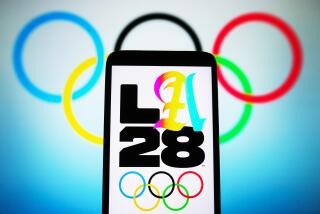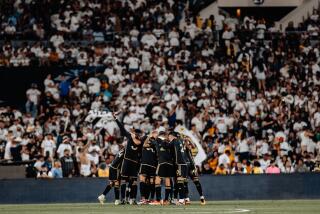Buying a Super Bowl Isn’t Cheap, but the Rewards Are Worth It
On the night that the NFL voted in Hawaii last month to move the 1993 Super Bowl from Phoenix to Pasadena, David Simon, president of the Los Angeles Sports Council, remembered two old newspaper headlines:
“DEWEY BEATS TRUMAN.”
“PHOENIX BEATS LOS ANGELES.”
The first was on the Chicago Tribune’s front page in 1948, when the paper made an erroneous early edition guess that the favorite, Thomas E. Dewey, would wrest the presidency from Harry S. Truman.
The other headline was composed during the NFL convention a year ago in Orlando, Fla., where Phoenix routed the combined forces of Los Angeles, Pasadena and Anaheim on the fifth ballot.
Or so it had seemed.
At stake that day in Florida was Super Bowl XXVII, which, assuming Arizona would approve a paid holiday honoring Martin Luther King Jr., was destined for Phoenix.
“We know now how Harry Truman felt in 1948 when the early results came in,” said Simon, who coordinated the four-year effort to bring pro football’s championship game to the Rose Bowl Jan. 31, 1993.
“We thought we’d lost to Phoenix fair and square,” he added. “(After the Arizona elections), it surprised us to get a second chance, (but) when we did, we determined to make the most of it.”
Making the most of any Super Bowl chance today is a costly enterprise.
The last time the game was at the Rose Bowl, in 1987, the NFL spent about $4 million to put on Super Bowl XXI.
In 1993, it will receive that much simply for putting Super Bowl XXVII there.
During their Hawaii meetings, NFL teams and their owners were promised $4-million worth of services and goods, cost-free, by the Los Angeles-area bidding committee, which represented the three communities that wanted the game--Pasadena, Anaheim and Los Angeles--but could no longer get it, they found, without a unified effort.
The $8-million swing reflects the steadily increasing economic value of the Super Bowl and the eagerness with which cities the size of Tampa and Minneapolis have been bidding for it with local funds.
In 1988, for example, after spending $3 million to $4 million, the San Diego area got back an estimated $150 million from Super Bowl XXII spenders. And when Super Bowl XXVI is played in Minneapolis next January, Twin Cities businessmen, having made a similar investment, expect to reap even more.
“We had to keep up with Minneapolis,” Simon said. “We had to keep up with San Diego and Tampa. A metropolitan area like Los Angeles has two choices these days: We can match the financial bids of smaller cities for the Super Bowl, or we can do without.”
Doing without is unthinkable, said radio executive Willie Davis, the Hall of Fame member from Green Bay who attended the NFL convention as vice chairman of the Los Angeles committee.
“Why let $150 million get away?” Davis asked. “The Super Bowl is valuable because it (attracts) the rich and famous from around the country. At the World Series, most of the crowd is made up of fans from the competing cities--and that’s the way it is at most championship events.”
The Los Angeles-area bidding delegation pledged to give the NFL owners:
--Free chauffeured limousines, one for each owner, throughout the week leading up to the game and on the day of the game, as well as the day after.
--Free helicopters, as many as required, if they would rather fly during the week or on game day.
--Free buses for the press.
--Free buses for the competing teams.
--Free game-day rent at the Rose Bowl, a $1.54-million value.
--Free game-day expenses, for ushers and other help, a $225,000 value.
--Thirty free luxury boxes on a high rim of the Rose Bowl, containing a total of 416 seats for the owners and their friends.
--Free parking for 5,799 NFL vehicles in paved parking spaces near the stadium.
--In addition, the NFL will be given the City of Pasadena’s full share of concession revenues, with Los Angeles business interests reimbursing Pasadena.
--There also will be free admission to Disneyland, Universal Studios and any other attractions the owners or their families wish to attend, as well as free visits, with guides if desired, to cultural attractions, including theaters.
--Free hotel rooms for the teams, their coaches and staffs.
--Free hotel rooms for the 125-person league staff.
--Free practice sites at USC and UCLA or in Orange County, at the NFL’s discretion. Some new Eastern owners have an impression that in January there might be less smog to interfere with team practice in Orange County.
--Choice of two no-cost sites for the NFL’s $500,000 Friday night party, the Sports Arena or the Pasadena Convention Center, or two low-cost sites, Disneyland and Universal Studios.
--Free use of 60 hotel rooms for the NFL Players’ Clinic.
--Free use of Brookside Golf Course for the NFL Charities golf tournament, which benefits owners’ charities.
--Free use of Rosemont Pavilion and the nearby Brookside athletic fields and unpaved parking lots for the league’s annual Tent City for NFL sponsors and news media.
All of the above is to be provided--and funded on a $4-million budget--by a newly formed special Super Bowl XXVII Host Committee chaired by Los Angeles businessman Sheldon I. Ausman, who also chaired the bidding delegation.
In return, Ausman said, the NFL has promised his committee 2,500 Super Bowl tickets at face value. These tickets, when repriced and resold in corporate kits--with preferred parking, pregame brunch, postgame entertainment and other little favors included--will net an estimated $1 million, or about 25% of the committee’s total budget.
The other $3 million is expected to be paid by the local tourist-related elements that underwrote the 1984 Olympic Games, which also were funded in part by thousands of expensive corporate kits. Although Pasadena will gain the most on game day, Los Angeles and Orange County businesses have the most to gain during Super Bowl week.
Accordingly, the Host Committee is counting on area-wide cooperation next year in the final months of an adventure that began at an NFL meeting four years ago.
On that occasion, the three partners--Los Angeles, Pasadena and Anaheim--each entered separate Super Bowl bids on behalf of the Coliseum, Rose Bowl and Anaheim Stadium, respectively.
Each spent about $100,000, and all failed.
Later, all agreed that nothing but united action would bring another Super Bowl this way.
Thus was born the coalition that finally won Super Bowl XXVII.
As for the site--Coliseum, Rose Bowl or Anaheim Stadium--”The (coalition) decided to leave it up to the NFL,” Sports Council President Simon said.
The NFL chose Pasadena.
“It was an easy choice,” said Philadelphia Eagle owner Norman Braman, who heads the league’s Super Bowl site committee. “They’re putting in luxury boxes at the Rose Bowl, and they have more overall seating.”
The Coliseum is planning luxury boxes, too, but can’t guarantee to have them by 1993.
“In the NFL’s rotation system, the Super Bowl will probably return to the (Far West) in 1998,” Simon said. “I’m sure the Coliseum will have a good chance to get it then if their remodeling is finished (in the mid-’90s) when the NFL calls for 1998 bids.”
At present, Rose Bowl capacity exceeds the Coliseum’s by about 10,000--a difference, at $150 a ticket, of $1.5 million.
“More important, that means another 100 tickets for each owner,” said Simon, a Los Angeles native who got into sports as one of Peter Ueberroth’s assistants at the 1984 Olympics.
During the Los Angeles area’s winning race against San Diego in the 1993 bidding, the size of the Rose Bowl also was a factor.
“But I think our new coalition spirit was a bigger factor,” said Ausman, a Marvin Davis corporate executive who once headed Arthur Andersen accounting enterprises.
There was an area-wide letter-writing campaign, for example, in which NFL owners were contacted by such executives as Lod Cook of Arco, Jim Miscoll of the Bank of America and Chuck Miller of Avery Dennison.
In a companion telephone campaign, many owners were contacted by, among others, Sam Bell of an accounting firm, Alan Rothenberg of the Clippers and a law firm and USC Athletic Director Mike McGee.
“This area has had a reputation for not going all-out as a community,” Ausman said. “We’re trying to change that.”
The goal, Simon said, “is to involve a large area as thoroughly and successfully as Tampa and San Diego have been involved in Super Bowl operations.”
The Los Angeles activists are thinking big.
“We’re talking about not just a game but a model for the future,” Simon said.
“We want the Olympics in the new Coliseum. We want to be in the Super Bowl rotation indefinitely. And we hope to show that sports is one of the best ways to build bridges from one city to another in a community as large as ours.”
More to Read
Go beyond the scoreboard
Get the latest on L.A.'s teams in the daily Sports Report newsletter.
You may occasionally receive promotional content from the Los Angeles Times.










